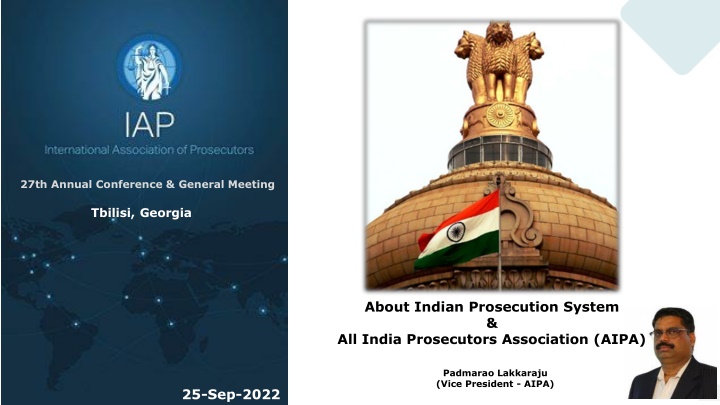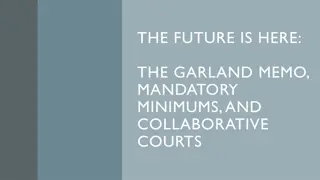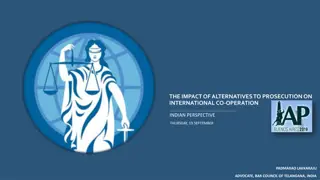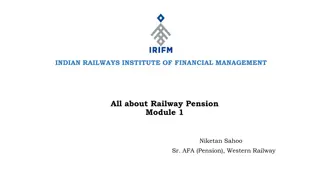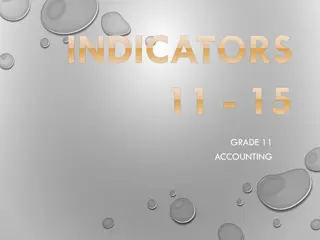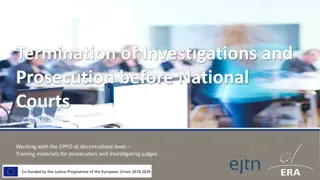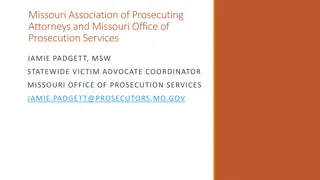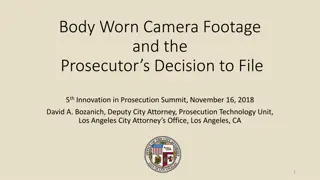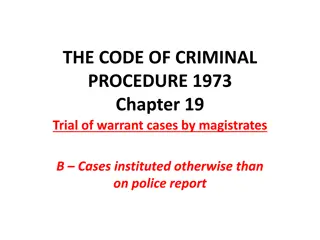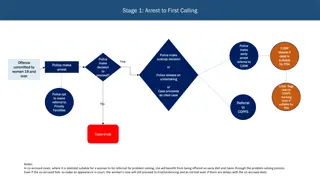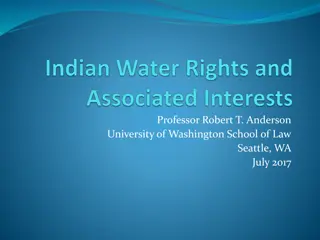Evolution of Indian Prosecution System and Current Structure
Evolution of the Indian prosecution system dates back to multiple eras, with changes in who could conduct prosecution in court. The present system includes Special Public Prosecutors and Cadre Prosecutors, appointed based on legal expertise and tenure. The hierarchy of courts assigns different prosecutors based on the severity of offenses, with specific roles at each level.
Download Presentation

Please find below an Image/Link to download the presentation.
The content on the website is provided AS IS for your information and personal use only. It may not be sold, licensed, or shared on other websites without obtaining consent from the author.If you encounter any issues during the download, it is possible that the publisher has removed the file from their server.
You are allowed to download the files provided on this website for personal or commercial use, subject to the condition that they are used lawfully. All files are the property of their respective owners.
The content on the website is provided AS IS for your information and personal use only. It may not be sold, licensed, or shared on other websites without obtaining consent from the author.
E N D
Presentation Transcript
27th Annual Conference & General Meeting Tbilisi, Georgia About Indian Prosecution System & All India Prosecutors Association (AIPA) Padmarao Lakkaraju (Vice President - AIPA) 25-Sep-2022
INDIA - A FEDERATION OF STATES & UNION TERRITORIES Prosecution is in the concurrent list of Indian Constitution The individual state governments are empowered to make rules and appointments Each of the 28 states & 8 Union territories has their own prosecution department & association 2
EVOLUTION OF INDIAN PROSECUTION SYSTEM LEGAL PROFESSIONAL ONLY CHANAKYA 275 BCE 1973 Gradually, any legal professional or any police officer who has not investigated the case could conduct prosecution in the Court. Codified Later, it was restricted only to legal professionals who are proficient in law and members of the Advocates Bar Association CURRENT SYSTEM Existing Since Ages ANCIENT Codified as Criminal Procedure Code Any Good Samaritan could do the prosecution & could defend the accused 3
PRESENT PROSECUTION SYSTEM Special Public Prosecutors Cadre Prosecutors Tenure Prosecutors The Advocates who are having at least a minimum of 3 years of legal practice are eligible for recruitment as Prosecuting Officers These officers will continue in the Prosecution s department till the date of superannuation that is ranging from 58 to 61 years of age depending on each State Government These Prosecutors are appointed on adhoc. basis for a period ranging from 1 year to 6 years These Prosecutors are appointed for conducting prosecution either on specialized laws or particular cases The Public Prosecutors are appointed under Section 24 of the Criminal Procedure Code, 1973 & Assistant Public Prosecutors under Section 25 of the CRPC, 1973. 4
HIERARCHY OF THE COURTS AND PROSECUTORS Supreme Court: Is the highest apex court. There are no particular prosecutors High Courts: State level Apex Courts - is an Appellant Court of the trial Courts. The Public Prosecutor is appointed only for a particular period by choosing an Advocate from the Advocates bar Association. Sessions Courts: Deal with heinous crimes which are punishable for more than 10 years to life imprisonment. Conducted by Cadre or Tenure prosecutors with more than 10 years experience Sub-Courts: Have jurisdiction to conduct the trial for the offences with a punishment of more than 7 years but less than 10 years Magistrate Courts: Criminal offences which are punishable for less than 7 years. APP/Sr. APPs conducts the prosecution. Mostly Cadre officers 5
PERMISSION TO CONDUCT PROSECUTION Section 302 of Crpc: 302. Permission to conduct prosecution. 1. Any Magistrate inquiring into or trying a case may permit the prosecution to be conducted by any person other than a police officer below the rank of Inspector; but no person, other than the Advocate General or Government Advocate or a Public Prosecutor or Assistant Public Prosecutor, shall be entitled to do so without such permission: Provided that no police officer shall be permitted to conduct the prosecution if he has taken part in the investigation into the offence with respect to which the accused is being prosecuted. 2. Any person conducting the prosecution may do so personally or by a pleader. 6
ROLE OF ALL INDIA PROSECUTORS' ASSOCIATION (AIPA) AIPA was established in the year 2003 with an objective to connect prosecutors in different States and Union territories of India. Today, AIPA is proud to have Prosecutors from ~20 states in India. The mission of AIPA is to remove the disparity in the status, pay scales, facilities and pride among the prosecutors in different States and Union Territories of India. In this regard the AIPA has filed a Writ Petition in Supreme Court of India in the year 2014 which is likely to be decided this year, i.e. 2022. This herculean task was taken up by AIPA as they had to co- ordinate all the Directorate of Prosecutions in India. AIPA has also enabled all the Prosecutors in India to interact with other Prosecutors easily to discuss the issues, cases, exchange of information, etc. 7
ROLE OF AIPA DURING COVID TIMES Self Protection Personal Level Prosecution Prosecution Associations successfully lobbied to include prosecutors in frontline workers category, who must invariably perform their duties and got all the Prosecutors vaccinated on par with Doctors (The first set of citizens who got vaccinated) The Prosecution was conducted online though initially it was restricted to the emergency cases like bails later the trial was also conducted online. Further, thanks to the International Association of Prosecutors (IAP) web conferences which alerted all the countries about the novel crimes evolved due to the pandemic particularly the cyber crimes. The AIPA has spread these messages to different Prosecutors in India and alerted them from these kinds of crimes Prosecution network helped other Prosecutors in different states, in assisting the Prosecutors and their families to get good medical facilities like Doctor consultation, oxygen, beds in] hospital and ventilators 8
IAP-AIPA A momentous event in the history of AIPA had taken place when IAP President, Mr. Cheol-Kyu Hwang visited India in July 2022 and understood the prosecution system in India Indian prosecutors who met Mr. Hwang expressed their immense happiness. Everyone felt that the meeting helped in building awareness about IAP Everyone expressed their gratitude to IAP and particularly Mr. Hwang for considering AIPA as a partner. Indian prosecutors perceive this as an opportunity for mutual co-operation with prosecutors of different countries. AIPA is looking forward to play an active role in mutual legal assistance (MLA) and PEP (Prosecutor Exchange Program). 9
THANK YOU Source of Pictures used: Internet
